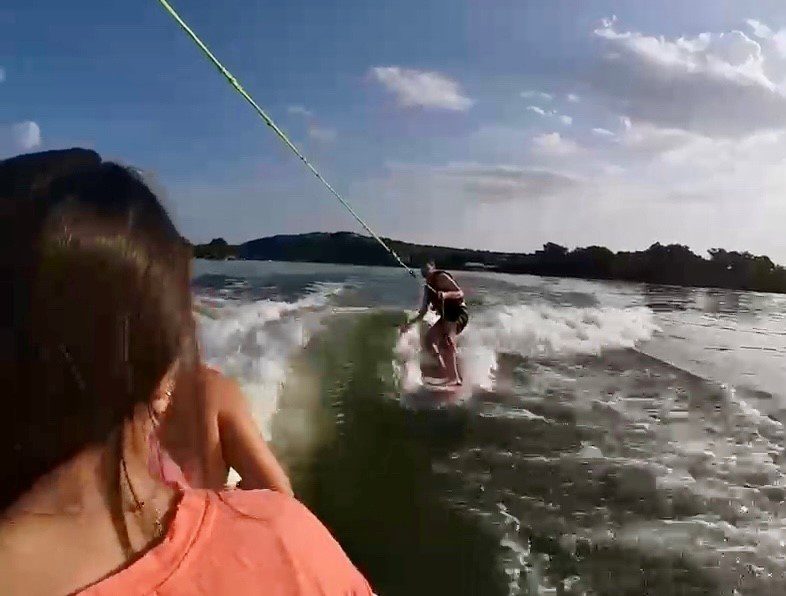
Shaking
He floats on his back in the green glassy lake, his feet sticking out of the water and his toes gripping the rubber tread on the slick fiberglass board. His teenage daughter sits on the boat near four of her friends and their dads. One dad is perched tall in the driver’s seat. The other dad sits on the stern, arm cocked, ready to toss the rope.
It’s his first time trying to wake surf behind a ski boat. He is usually the one driving, pulling his daughter and watching her pop a giant smile when effortlessly catching the perfect wave. Today, he floats in the water, courtesy of his black life jacket, hoping he will be able to stand on the board.
He’s thrown the rope. His heart beats faster. His body begins shaking slightly, as if it’s a cold winter’s day, but it’s only a Parkinson’s adrenaline response, which he knows well.
Reflecting
His mind drifts for a moment, harking back five years to when he heard those life-altering words from his doctor, “You have Parkinson’s disease,” and he assumed his life was all but over. He thought, too, of his nearly one year of hiding and suffering in silence.
He never imagined he’d be learning to wake surf five years later, and much less that life would be richer than ever before in certain ways: the generous people he met because of Parkinson’s; the deep reflections on values, priorities, and perspectives now shaped by a chronic, progressive illness that does not relent; that an awful disease could make him a better father, partner, colleague, and friend?
“Are you OK, Daddy,” his daughter asks. He gives her a thumbs-up and blows her a kiss before going through a checklist of things to do.
Let the boat pull me up. Keep my knees bent. Transfer my weight once I’m up and out of the water. Square my shoulders with the wake. Let the wave do the work.
Failing
Four times, he tries and fails. What feels like a gallon of lake water shoots up his nose as he struggles to stand and then to balance himself on the small unforgiving board. His heart beats faster and his body quivers as his daughter looks on.
“Give me one more shot,” he says to the driver, “I think I know what I’m doing wrong.”
The driver pulls the boat close to him and the other dad throws out the rope.
“The fifth time’s the charm,” he says, before rehearsing his checklist a final time.
Surfing
When he’s ready, he gives a thumbs up. The driver hits the throttle and the boat’s engine revs, pulling him forward. The wake quickly grows tall as he plows for a few feet and then pops out of the water and stands on the board, knees slightly bent, shoulders mostly square to the boat’s tall wake, a little wobbly but surfing, as he did as a boy in the green Atlantic.
His daughter yells, “There you go, Dad!”
He pops a giant smile as he rides the wave and looks to the sky.
__________
Allan Cole is Deputy to the President for Societal Challenges and Opportunities at The University of Texas at Austin, where he also serves as a professor in The Steve Hicks School of Social Work and, by courtesy, as a professor of psychiatry and behavioral sciences at the Dell Medical School. Diagnosed with Parkinson’s in 2016, at the age of 48, he is the author or editor of many books on a range of topics related to bereavement, anxiety, and spirituality. His latest book is Counseling Persons with Parkinson’s Disease (Oxford University Press) and his next book, Discerning the Way: Lessons from Parkinson’s Disease (Cascade), will be published in late 2021. He is also working on a book of poetry titled In the Care of Plenty: Poems (Resource Publications), which will be published in 2022. Follow him on Twitter @PDWise.
